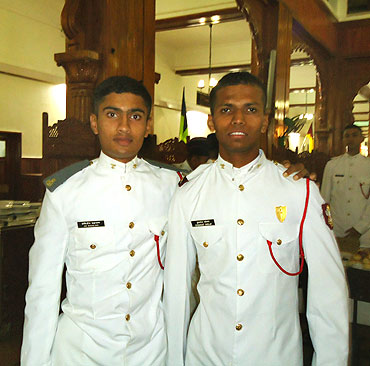
 In our special year-end section, Rediff.com looks at people -- who for better or worse -- wrote the India story this year.
In our special year-end section, Rediff.com looks at people -- who for better or worse -- wrote the India story this year. Krishnant Gholap is an autorickshaw driver's son. After two failed attempts, he made it to the National Defence Academy, Khadakvasala, which he saw as the only way out into a better life.
He graduated from the NDA last month.
Abhishek Mande spent time with Krishnant on his last day at the Academy and met the Gholaps at their humble home in Pune. He tells the story of the hardships faced by the family to realise a long-cherished dream.
Sometime in the last semester at the NDA, Cadet Krishnant Gholap was struggling.
He had to pass a run test -- complete a stretch of 5 km in 26 minutes. This was his fourth and final attempt.
The first three times the cadet missed the target by a little over 20 seconds. If he couldn't meet it this time, he would have to stay back for another six months and graduate one batch behind his peers.
There were other things to consider too. His sister Rohini was to get married. The family had been saving up for the wedding for a long time.
Another six months would mean the family would also have to keep aside Rs 1,500 each month for his pocket money according to NDA rules.
For a family that lives in an apartment slightly larger than the cadets's rooms in the Academy, this was a lot of money.
Plus the fact that he could not make it with the rest of the batch would be a blot on his career.
"There were too many things tied in with my passing out (from the NDA). I couldn't afford to lose," Krishnant recalls.
And so he ran.
With a 20-odd kilo bag on his back, a gun on his shoulder and a pair of boots as heavy as lead, Krishnant Gholap ran because his life depended on it.
On November 29, 2010 a little past nine in the morning, Cadet Gholap marched with the rest of his batch and stepped on the 'Antim Pag' or the 'Final Step'.
Somewhat poetically, as the last of the cadets marched out of the parade ground, the sun -- that was hidden behind the clouds all morning -- began to shine brightly.
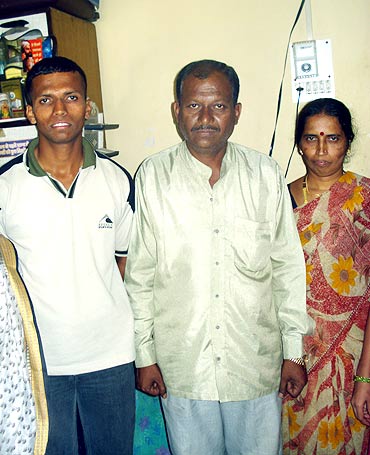
Later, they waited as Krishnant packed his belongings and drove off in a battered Maruti 800 that a family friend had lent them for the weekend.
This was the only luxury they could afford because Krishnant's father Chandrakant is a rickshaw driver in Pune. His mother Shubhangi runs a small tailoring business from their house -- a 270 sq ft apartment in Nana Peth, a lower middle class locality of Pune.
The house opens to a dingy corridor that has no lights and has enough space for just one person to walk. On each of the four floors, there are about 40 such homes where families sleep, eat and work out of.
Some of them lack amenities that many of us take for granted -- like a television and a refrigerator. A self-contained toilet block is what would put them a rung above the residents.
Twenty-one-year-old Krishnant is often asked how he managed to study in such adverse conditions. His response is simple: "I studied because I wanted to get out of here."
No one in the Gholap family has completed their graduation before. The closest anyone came was Adinath, Krishnant's 37-year-old uncle who gave up because he lost interest.
Chandrakant, soon after his Class 10, sold chivda outside a cinema hall before it shut down. Since then, he has driven rickshaw.
Shubhangi, his mother, a native of Solapur, came to Pune to study and ended up getting married soon after her Class 11. A year later, Krishnant was born and that was the last she saw of her textbooks.
What kept Shubhangi going was the single-minded determination to see her children get a better life. The tailoring course she did in school came handy. So she started sewing. Over twenty years later the sewing machine has not stopped.
Two days before the Passing Out Parade at NDA, when her son came to pick up his family, she was still at it. There was a deadline to meet.
While the rest of the family were getting ready, Shubhangi stitched two sari blouses and had them delivered to her clients. "Krishnant had to drag me out of the house," she laughs.
Shubhangi tells me that their father funded the children's education till Class 10.
"After that I paid for everything."
Her daughter Rohini is completing her engineering course from the Marathwada Mitra Mandal's Institute of Technology, Lohgaon. Each year leaves the family with a dent of a little over Rs 70,000.
Fortunately, they didn't have to pay for Krishnant's education, but according to the Academy rules they had to deposit a certain sum each month for his expenses.
Before Krishnant got into NDA, his mother paid Rs 54,000 for an engineering course that was supposed to be his backup plan.
When he got through at NDA, they got a refund of half the money because they had applied under the Economically Backward Classes quota.
"The other half we had to let go. We didn't really have a choice," Shubhangi says not with regret, but rather matter of fact.
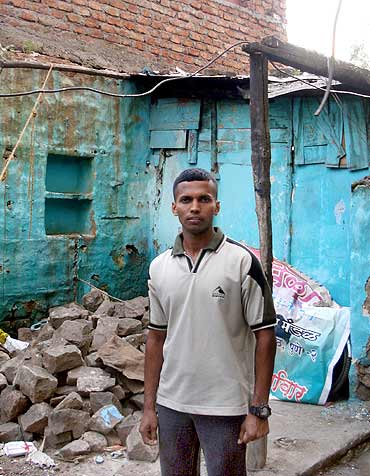
"I come from a Marathi medium school so my English wasn't good. Neither was my general knowledge. During my first attempt, when they asked me about the Seven Sister states of the North East I had no idea what they were talking about."
Krishnant appeared again and failed.
In the interim he tried to get into the College of Military Engineering, without success.
"I was desperate. I wanted to get into the army at all costs."
***
When he was 15, Krishnant sat in the hall of his school -- New English School, Ramanbaug. Along with hundreds of other students he listened intently to Ajinkya Umranikar, one of his seniors who had completed his schooling and joined the NDA.
Ajinkya told them about the life in the army and spoke to them about considering a career in the defence forces.
When the school closed for vacations, Krishnant discovered an advertisement of an institute that trained aspirants for the Service Selection Board.
Lieutenant Colonel Pradeep Brahmankar (retd), who ran the institute, took Krishnant under his wings.
At the institute, Krishnant found himself with people who like him wanted to join the defence services. "When people around you have the same orientation as you, it becomes easier to work towards your goal. I knew I had to pick up English and work on my general knowledge so I started reading newspaper articles, magazines."
"Earlier I wouldn't surf the Internet very regularly," he adds. "When I was preparing for the NDA entrance, I made it a point to spend at least an hour or two in an Internet cafe, researching topics, cross referencing and learning about things I had no knowledge of."
"Public speaking wasn't my area of strength either, so I had work on that as well. Brahmankar Sir would teach me how to say something effectively. He asked me to reduce my hand movements and focus on learning statistics and facts."
For someone who scored 90 per cent marks at the Class 10 examination, the two failed attempts in the NDA entrance made him seriously introspect and question where he was going wrong.
Time was slipping away as Krishnant was fast approaching the maximum permissible age limit for the NDA. He had secured admission to an engineering course, but his heart lay elsewhere.
In September 2007, he decided to give a final shot at his dreams.
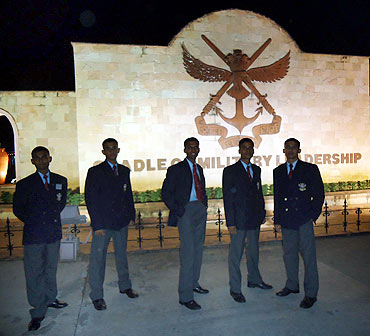
"Initially, I was lost. There was no one I knew and everyone looked so busy. I felt homesick. The first 45 days we underwent an induction programme. They told us what to expect from the course, taught us swimming, table manners and etiquette."
Then the course started.
"It was gruelling. We would wake up as early as 5.30 am and go to bed around 10.30 in the night. There was hardly any time to do anything else."
"In the beginning we would take really long to get ready in the mornings -- ironing clothes, cleaning the buttons till they shone, polishing shoes and having to make it in time for the morning drill."
"Later, as we became more disciplined we realised it wasn't as difficult as it used to be."
That is what he misses most when he is not at the Academy.
"A couple of days away from that life are fine. But I get bored. During term breaks I used to watch television, eat and sleep. I miss that disciplined life."
I ask if he is in touch with his friends from school. He says he isn't.
Although he doesn't spell it out I figure he cannot relate to the world outside the military.
Till a few hours ago, we were in the sprawling, spotlessly clean and dexterously organised NDA campus. The cars would go past almost noiselessly. There was decorum and an air of peace that gave you the mind space to think beyond your existence.
In the Pune area where his family lives, a cow has blocked the single lane road, a common garbage bin overflows, rickshaws honk away. There is filth all over; half-constructed buildings caught in property disputes and a general sense of utter chaos.
We don't speak for the longest time.
Then he says, "I want to give them a better future. The reason I wanted to join the army is because it would bring respect and honour to my family. I could have become an engineer or a doctor. But people look up to soldiers. They look up to their families."
Needless to say, sending their only son to the army wasn't an easy decision for his parents.
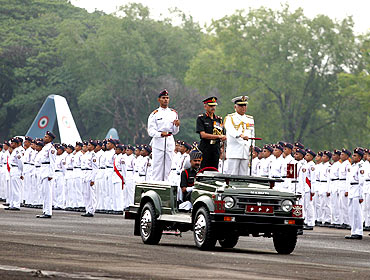
"Till the last hour of the last day they were asking me why. And I kept telling them that it was for his good it was because he could live a better life -- away from this one. I missed him terribly and I will in the future. But I cannot hold on to him just because he is the only son."
Shubhangi breaks down.
"I worked hard to get him there. We didn't get the house painted or buy things we didn't need. I would visit my parents just once every year and never borrow anything from anyone. I never fell sick and I won't, not until my children complete their education."
"People ask me if I am afraid of losing my only son. Of course, I am. Everyone dies. If he dies in war it will be for a good cause."
Krishnant's father Chandrakant doesn't speak much. For the time I spent at their home, he runs errands. Occasionally, he takes telephone calls from journalists.
Earlier that day over chai, Chandrakant told me what every soldier's parent would say. "What is the guarantee that you won't die when you walk out of this building?" he asked rhetorically. "And it isn't like everyone who joins the army dies early. So why think negatively?"
While addressing the parade, Air Chief Marshal Pradeep Naik, the Chief of the Air Staff, had made a passing reference to corruption in the armed forces. When I ask Chandrakant about it, he shoots back. "Every organisation has corrupt people. You choose what you want to be."
Chandrakant comes across as one of those people who are aware of their place in the world. He knows his son's achievements have little or nothing to do with his life.
He took a couple of days off to spend some time at the Academy with his family. On the morning of the Passing Out Parade, Chandrakant was already itching to get back to work.
"Hunger doesn't take a day off. I have to make money," he says.
Chandrakant doesn't pick up and drop school children anymore. Although it is a profitable business, he says he is getting too old for it. Daytime driving in the city isn't for him. Besides, he suffers high blood pressure and a bunch of school kids in the backseat isn't exactly relaxing for any driver.
So he steps out of the house in the evening and drives around the city till past midnight before calling it a day. That way he earns less money, but is at peace.
As the evening passes, Chandrakant is already looking at the wall clock.
A little before 6.30 pm he will get off the chair, pull the white uniform hanging on the wall, go to the bathroom to change, take the keys, say a silent prayer and walk down the dark staircase.
Later, his rickshaw will splutter to life and Chandrakant Gholap will disappear into the traffic with the hope that his soldier son will go on to do great things.
Krishnant Gholap wants to be part of the infantry. On January 9, he will be enrolled at the Indian Military Academy and undergo a year of training before he is inducted into the Indian Army as a lieutenant.